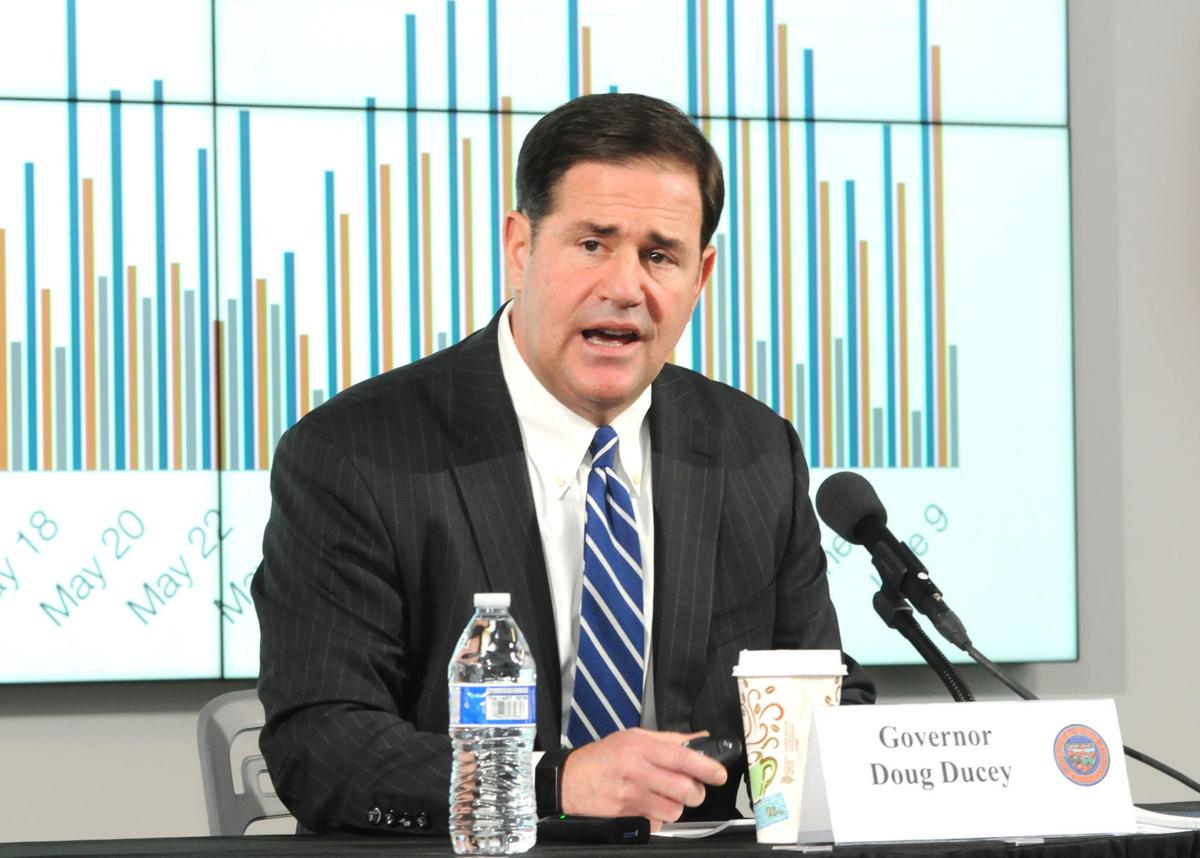PHOENIX – Gov. Doug Ducey said Thursday that he does not intend to impose new restrictions on Arizonans — or even require them to wear masks — despite more people contracting COVID-19.
In fact, look for him to actually move in the opposite direction.
“We’re seeing increasing cases,” he said during a media briefing.
That was underscored by figures from his own Department of Health Services showing a record 1,291 patients in Arizona hospitals. And that doesn’t count another 429 in intensive-care beds, a figure exceeded only by a peak of 438 just three days earlier.
And the number of COVID-19 patients seen in the emergency room his 848, trying a record set just two days ago.
All totaled, Arizona has now logged 31,264 confirmed cases of the virus with 1,127 deaths, including 34 just Thursday alone.
But the governor is undeterred, rebuffing a question of whether he would consider reimposing some of the restrictions he first put in place in March like his stay-home order and restricting commercial activity to only essential businesses.
“It’s not under discussion,” he said. Instead, Ducey is focused on moving forward.
“We’re going to continue our gradual and phased-in reopening,” the governor said. “We will balance public health with public safety.”
State health director Cara Christ put a finer point on it, saying the measures that had previously been imposed were designed to ensure that Arizona had enough hospital capacity to deal with an outbreak.
And now?
“We know that it’s in the community,” she said.
“We are not going to be able to stop the spread,” Christ continued. “And so we can’t stop living as well.”
Ducey acknowledged that his efforts have had a two-pronged approach.
“This has always been about saving lives,” he said.
“And it’s also about livelihoods in the state of Arizona,” the governor continued. “We’re going to do this in a balanced and responsible way for the people of Arizona.”
Christ separately acknowledged that there have been some “hot spots,” places in the state where the virus has spread quicker than elsewhere. But Ducey rejected the possibility of giving city and county officials the options of imposing their own restrictions.
“I believe that the government that is closest to the people is best — except in a global pandemic,” he said.
“We want to have clarity and consistency for our citizens,” Ducey said. “And we want to reduce the confusion that’s happened across the state and across the country.”
Ducey and Christ have repeatedly argued that Arizona has more confirmed cases of coronavirus than elsewhere because more people have been tested.
But statistics from Johns Hopkins University, updated Thursday morning, show that Arizona, at a 13% average, has a higher rate of the tests that come back positive than any other state. And the Biodesign Institute at Arizona State University found the positive test rate for Wednesday, the most recent figures available, actually hit 24%.
“We have noticed an increase in the percent positivity,” Christ said.
“We do know there is community spread,” she continued. “We are going to be working at trying to bring that back down.”
Part of that, Christ said, will be a “public health message.”
What that message includes, she said, is encouraging people to wear a cloth face covering when they cannot “physically distance” from others and to make sure they’re staying home when they’re feeling sick.
Ducey endorsed that advice.
“I’m all for face masks when you can’t physically distance,” he said. And the governor said he does wear a mask in those circumstances.
“I was in Walgreens picking up some things on the way home and I’ve been to the grocery store,” Ducey said. “And in both places I wore a face mask.”
But all that remains voluntary.
“There are some people that can’t wear masks for whatever reason, shortness of breath or they are asthmatic,” the governor said.
Ducey also disputed reports that Arizona hospitals are reaching capacity.
Christ did concede that reports from some hospitals — they self-report and she did not name names — showed that more than 80 percent of their beds were occupied.
That is a trigger point at which, under the governor’s executive orders, a facility can no longer do elective surgery.
But the health director said she has not clamped down on any of them, saying she wants to work with hospital administrators to see if they agree with the numbers.
Ducey, for his part, said he was unconcerned even if hospitals do hit that 80 percent level.
He pointed out that all facilities are required to have plans in place to expand the number of beds by at least 25 percent if needed.
"We're tough as saguaros," editorial cartoonist David Fitzsimmons says. He says he saw a video made for the people of Detroit and became inspired to do his own take for Tucson.
Photos for May 29: Tucson gets by during Coronavirus Pandemic
Tucson gets by during coronavirus pandemic
Updated
The iconic Casa Molina bull and matador statue both sport masks on the first full week of the loosening of COVID19 restrictions, May 23, 2020, Tucson, Ariz. The bull previously had a mask on the testicles.
Tucson gets by during coronavirus pandemic
Updated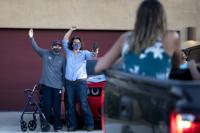
Michelle Leon Cordova, right, mother, and her son Sahuarita High School senior Lino Cordova, whom is fighting cancer, wave at staff members from Diamonds Children Center, friends and the Marana Police Department during a car parade, celebrating Lino's graduation, outside of his home on May 13, 2020 in Sahuarita, Ariz. Cordova stood on the sidewalk while the team from Diamond Children Center, friends and the Marana police department gave Cordova a graduation gar parade. Cordova was given a gift basket with his favorite snacks, gift cards as well as other items he enjoys. The car parade, also, celebrated another graduating senior fighting cancer from Empire High School, Noah Nieto. Nieto, also, received a gift basket with snacks, gift cards and other items Lino enjoys.
Tucson gets by during coronavirus pandemic
Updated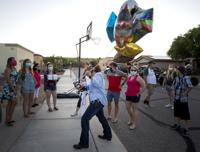
Michelle Leon Cordova, right, mother, brings celebration balloons to a car after staff members from Diamonds Children Center, friends and the Marana Police Department celebrate Sahuarita High School senior Lino Cordova, whom is fighting cancer, graduation with a car parade outside of his home on May 13, 2020 in Sahuarita, Ariz. Cordova stood on the sidewalk while the team from Diamond Children Center, friends and the Marana police department gave Cordova a graduation gar parade. Cordova was given a gift basket with his favorite snacks, gift cards as well as other items he enjoys. The car parade, also, celebrated another graduating senior fighting cancer from Empire High School, Noah Nieto. Nieto, also, received a gift basket with snacks, gift cards and other items Lino enjoys.
Tucson gets by during coronavirus pandemic
Updated
Personnel from Tucson Medical Center line the heliport to watch A-10's from Davis-Monthan Air Force Base's 355th Wing and F-16's from the Arizona Air National Guard's 162nd Wing make a pass over the facility, one leg of an area wide community flyover, May 14, 2020, Tucson, Ariz.
Tucson gets by during coronavirus pandemic
Updated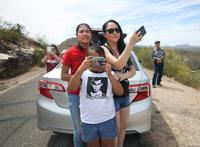
Nancy Celix-Campos, right, a respitory therapist at Tucson Medical Center, watches the military flyover with her daughters, Giana, 12, and Jazmyn, 8, from Sentinel Peak on May 14, 2020. Two F-16 Fighting Falcons from Arizona Air National GuardÕs 162nd Wing and two A-10 Thunderbolt II's from the 355th Wing, assigned to Davis-Monthan Air Force Base, fly over Tucson area hospitals to honor healthcare personnel and first responders as they are some of the frontline workers dealing with the coronavirus disease (COVID-19) head on. "It's been an exhausting two to three months," says Campos, "it's pretty cool, I like how they're going by each hospital."
Tucson gets by during coronavirus pandemic
Updated
Two F-16 Fighting Falcons from Arizona Air National Guard’s 162nd Wing and two A-10 Thunderbolt II's from the 355th Wing, assigned to Davis-Monthan Air Force Base, fly over Northwest Medical Center north of Tucson on May 14, 2020.
Tucson gets by during coronavirus pandemic
Updated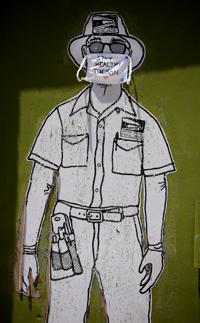
A letter carrier portrait on the Ok Market building, located in the Armory Park neighborhood, is adorned with a face mask on May 18, 2020.
Tucson gets by during coronavirus pandemic
Updated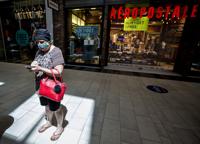
Rosemary Garcia waits for a family member outside of a store at Park Place Mall, 5870 E. Broadway Blvd., in Tucson, Ariz. on May 19, 2020. Malls reopened today under CDC guidelines and Gov. Ducey's new rules for businesses due to the Coronavirus pandemic. Park Place Mall has signs throughout the mall reminding customers to keep a six feet distance as well as hand sanitizer stations near each entrance. About half of the tables in the food court have been removed to allow for social distances as well as less than half of the stores have opened with new guidelines. Of the stores open, only 10 customers are allowed to shop in each store at a time.
Tucson gets by during coronavirus pandemic
Updated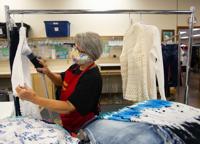
Pat Schlote steams clothing before it is put on the sales floor at the Golden Goose Thrift Shop in Catalina, Ariz., on May 21, 2020.
Tucson gets by during coronavirus pandemic
Updated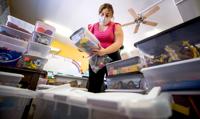
Ada Contreras, teaching assistant, looks through containers while reorganizing toys at Herencia Guadalupana Lab School, 6740 S. in Tucson, Ariz. on May 21, 2020. As Child care centers begin to re-open when they are ready, Herencia Guadalupana Lab School is reorganizing and cleaning everything in the facility before re-opening on June 2. To allow for social distancing and decrease the amount of items children touch, Herencia Guadalupana Lab School has sheds where items will go as well as placing items in containers organized by category.
Tucson gets by during coronavirus pandemic
Updated
Jen Martinez, right, softball coach, teaches Skylar Reilly about hitting during a session at Centerfield Baseball Academy, 5120 S. Julian Dr., in Tucson, Ariz. on May 21, 2020. After re-opening on Monday, Centerfield Baseball Academy has implemented new policies in response to the Coronavirus Pandemic such as wearing masks, cleaning, signage, hand sanitizer and limiting the amount of people inside the facility.
Tucson gets by during coronavirus pandemic
Updated
Karl Bosma, left, and George Cantua, with facilities and maintenance, lay down stickers to mark six-foot separation distance around one of the baggage carousels, part of the efforts at Tucson International Airport to work within the restrictions of COVID19, May 22, 2020, Tucson, Ariz.
Tucson gets by during coronavirus pandemic
Updated
A lone passenger waits for a flight near one of the shuttered restaurants in the B Gates before Memorial Day at Tucson International Airport on May 22, 2020.
Tucson gets by during coronavirus pandemic
Updated
Drew Cooper on the stage in the St. Philip's Plaza courtyard, May 22, 2020, Tucson, Ariz., where live music is back on the schedule.
Tucson gets by during coronavirus pandemic
Updated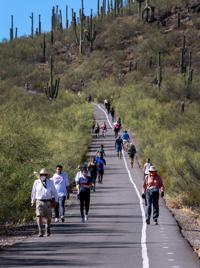
Many people visit Tumamoc Hill during the first day of Tumamoc's re-opening in Tucson, Ariz. on May 25, 2020. After being closed due to the Coronavirus pandemic, Tumamoc Hill re-opened with some modifications. There are hand sanitizer stations throughout the hike to the top as well as arrows, spaced 10-ft apart, lined up and down the hill. Some runners, hikers and walkers are also wearing masks during their hike. "The steps we are taking aim to provide our community with needed exercise, connection to our beautiful desert and a sense of comfort in such a trying time, while balancing the fact that gathering as a community endangers each of us and our loved ones. This is an unprecedented challenge that we are taking extremely seriously," said Benjamin T. Wilder, director of Tumamoc Hill. Visitors are also asked to limit their group to three people and to not touch the gate at the top of the hill- a tradition for some who make it to the top. "This is a time when we need to establish new traditions and adapt in a creative manner that embraces empathy, unity, care and patience," Wilder said.
Tucson gets by during coronavirus pandemic
Updated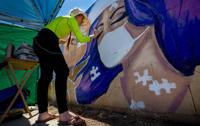
Pen Macias, artist, works on part 2 of a mural for a client on E. Broadway Rd., between S. Columbus Blvd. and S. Alvernon Way, in Tucson, Ariz. on May 25, 2020. Macias, known as The Desert Pen, has been working on her clients mural for the past three months. "It's the one thing I love, I have a passion for and the only thing I could be happy doing," said Macias. The mural represents her client, a single mother of four who works in the health care field. One half of the mural is dedicated to the connection between mothers and their children. The other half is dedicated to the connection between nurses and patients. The client wanted some positivity in the mural to show how nurses give a piece of themselves to their patients hence the puzzle pieces in the nurse and the patients, said Macias.
Tucson gets by during coronavirus pandemic
Updated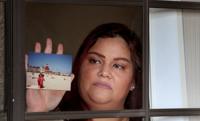
Christina Cortinas, posing at her home, May 28, 2020, Tucson, Ariz., with a photo of her and her mother, Catherine Rodriguez, in San Diego, 1991. Rodriguez is currently in assisted living and fighting COVID19. Cortinas hasn't seen her mother in months, the longest such span in her life.
Tucson gets by during coronavirus pandemic
Updated
Ruben Lopez looks through handouts while attending a Eviction Resource Fair with his family outside the Pima County Justice Court.



